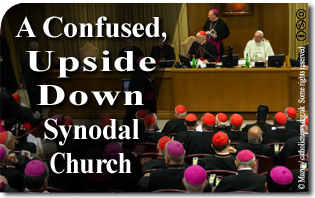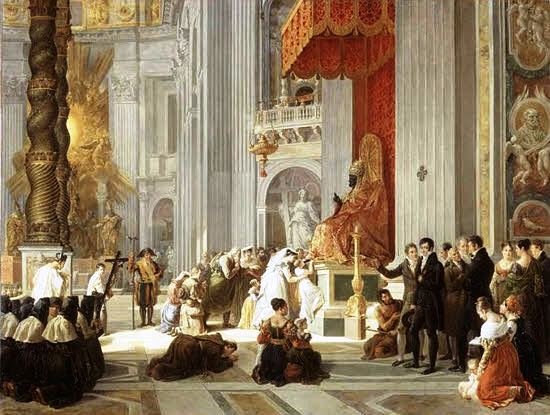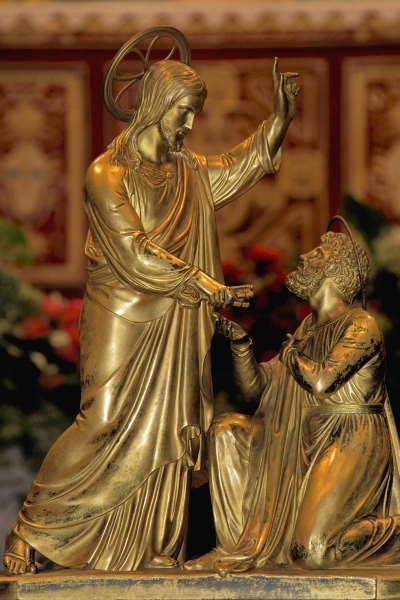by Luiz Sérgio Solimeo
© Mazur/catholicnews.org.uk CC BY-NC-SA 2.0 No changes. Some rights reserved.
“A Facile Repetition of What Is Obvious or Has Already Been Said”
After the most disparate news about the 2015 Synod on the Family, the event ended with an ambiguousdocument which allows an interpretation contradictory to Catholic doctrine, opening the doors for Communion for the divorced and civilly “remarried” (in fact, adulterers). Pope Francis’ final speech further increased the confusion by stating that the Synod was not about “settling all the issues having to do with the family” and hence it avoided “falling into a facile repetition of what is obvious or has already been said.”
What a strange statement. Should one not repeat the truths of the faith because it is “easy” to do and because they have already been uttered? How should this claim be interpreted in the light of Saint Paul’s incisive exhortation to Timothy, “Proclaim the word; be persistent whether it is convenient or inconvenient; convince, reprimand, encourage through all patience and teaching” (2 Tim. 4:2)?
This is all the more so since we find ourselves in the very situation predicted by the Apostle as he exhorted his disciple: “For the time will come when people will not tolerate sound doctrine but, following their own desires and insatiable curiosity, will accumulate teachers and will stop listening to the truth and will be diverted to myths” (2 Tim. 4:3-4).
Yes, our time more than any other requires an “easy repetition” of the doctrines already taught by the Church on the state of sin in which the divorced and “remarried” (an objective state of adultery) and pertinacious sodomites find themselves. This constant repetition of doctrine makes manifest the Church’s tradition; and that is how the successors of Peter and the Apostles fulfill the divine mandate: “Preach the Gospel to every creature” (Mark 16:15).
Cardinal Kasper: “A Deep Theology, a Theology While Kneeling”
In his speech, Pope Francis not only failed to establish the truth facing the confusion of the synodal document but harshly criticized those Synodal Fathers with “closed hearts” who hide “behind the Church’s teachings” sitting “in the chair of Moses” to judge wounded families with “superiority and superficiality.” It is not difficult to see that this criticism is addressed to those in the Synod who defended the Church’s traditional doctrine regarding adultery.
The constant repetition of doctrine makes manifest the Church’s tradition and fulfills the divine mandate. Especially in times predicted by the Apostle, “…when people will not tolerate sound doctrine but…will accumulate teachers and will stop listening to the truth and will be diverted to myths” (2 Tim. 4:3-4).
Indeed, the Pope has often manifested his admiration for the theses of innovators in his interviews and especially by repeatedly praising and supporting Walter Cardinal Kasper, the undisputed leader of this current, whose doctrine Francis has gone so far as to call “a deep theology...doing theology while kneeling.”[1]
A Worrisome Church Reform Program
If what happened at the Synod is extremely worrying, perhaps even more so is the program presented by Pope Francis for a complete reform of the Church.
Speaking on October 17, 2015 at a ceremony commemorating the 50th anniversary of the institution of the synod of bishops, Francis proposed to implement the process of transforming the Catholic Church into a “Synodal Church.”
By carefully examining this speech, one sees that this “synodalization” of the Church leads to abandoning the Church’s hierarchical and monarchical structure and adopting egalitarian attitudes in which effective power would reside in the “base”, i.e., in the ordinary faithful.[2]
“A Church Which Listens”
According to Francis, “A synodal Church is a Church which listens.” Thus, instead of Ecclesia docens (the teaching Church) we would have an Ecclesia audiens (a listening Church).
What would this “Church which listens” be like? Pope Francis says it would be a Church whereeveryone would listen to everyone:
The faithful people, the college of bishops, the Bishop of Rome: all listening to each other, and all listening to the Holy Spirit, the “Spirit of truth” (Jn 14:17), in order to know what he “says to the Churches” (Rev 2:7).[3]
Thus, the “Church which listens” would be a Church directly guided by the Holy Spirit in the way claimed by Pentecostal Churches through a continuous manifestation of the Paraclete, who would point the way and teach doctrine directly to the whole “people of God.”
The “Synodal Church,” An Inverted Pyramid
Now if the Spirit directly runs the Church and everyone ─ from the Pope down to the simple faithful ─ “hears” what He says and communicates in a permanent dialogue with everyone else the doctrines one must profess and the direction the Church should follow, the traditional notion of the Church as a perfect society structured in a hierarchical and monarchic way by divine institution, falls apart. She would become an egalitarian church, a society of equals.
Consistent with the democratic principle, if everyone is equal, power is found in the majority; it comes from the grassroots, from the people. And this appears to be the concept of Pope Francis, who does not hesitate to say that “in this [synodal] Church, as in an inverted pyramid, the top is located beneath the base,” recalling the condemned errors of Febronianism and of the Jansenist Synod of Pistoia.[4]
Keep Connected to the “Base” and Start From the People
Speaking about the organizations of diocesan synods ─ which he claims are the “first level of the exercise of synodality” ─ Pope Francis goes on to show the creative power of the pyramid’s “base”:
“Only to the extent that these organizations keep connected to the ‘base’ and start from people and their daily problems, can a synodal Church begin to take shape...”
“Listening” to the Holy Spirit, albeit egalitarian, would have three levels: first, listening to the people of God; then, listening to the bishops; and finally, to the Pope. This latter “listening” would be more intense since according to Francis’ speech the Pope is “the supreme witness to the fides totius Ecclesiae,” on whom it is incumbent “to speak as ‘pastor and teacher of all Christians.’”
It was to Saint Peter individually and not the Apostolic College that Our Lord Jesus Christ entrusted the direction of His Church. “And I say to thee: That thou art Peter; and upon this rock I will build My Church…And I will give to thee the keys of the kingdom of heaven…”
Despite the statement that the Pope “speak[s] as ‘pastor and teacher of all Christians’” it is not clear if this teaching function is received directly from Our Lord or emanates from the collective process of “listening.” If power in the inverted pyramid comes from the base, the latter hypothesis appears to be the one most likely.
On the other hand, the term “listening” to the Holy Spirit is very ambiguous because it suggests that He continues to “speak” as in the times of the Apostles, meaning that the official Revelation is not completed and that dogmas continuously evolve. Both propositions are errors condemned by Saint Pius X as part of the Modernist heresy.[5]
Is the Apostolic College, Not Peter, the Head of the Church?
Pope Francis makes the surprising statement that “Jesus founded the Church by setting at her head the Apostolic College” and that the role of Saint Peter is only that of confirming the brethren like a primus inter pares (first among equals).
Our Lord’s words transmitted by Saint Matthew leave no shadow of doubt as to the fact that the Rock upon which He would build His Church is Saint Peter individually and not the Apostolic College. It was to Saint Peter individually that Jesus entrusted the direction of His Church.
“Blessed art thou, Simon Bar-Jona: because flesh and blood hath not revealed it to thee, but my Father who is in heaven. And I say to thee: That thou art Peter; and upon this rock I will build my church, and the gates of hell shall not prevail against it. And I will give to thee the keys of the kingdom of heaven. And whatsoever thou shalt bind upon earth, it shall be bound also in heaven: and whatsoever thou shalt loose upon earth, it shall be loosed also in heaven” (Matt. 16:17-19).
The constant Tradition of the Church has interpreted these words to mean that Jesus directly entrusted to Saint Peter the post of Supreme Pastor of His Church.[6]
Equilibrium Between Interior Detachment and Esteem for the Exterior Pomp of One’s Office
Francis does not clearly distinguish between the interior aspect of the spiritual life of the holder of authority in the Church and the external, legal and institutional aspect corresponding to the exercise of the office received from Christ.
Thus he applies Our Lord’s exhortation to His disciples to be (unlike pagan authorities) as meek and humble as Himself (Matt. 20:25-27) in a legal and institutional sense to suggest that ecclesiastical authorities should divest themselves of their institutional power and of the very honors due to their office in order to establish an egalitarian system in the Church.
That is neither the Church’s tradition nor was it the way countless holy Popes conceived the exercise of authority. Thus, Saint Pius X, who was a perfect example of humility, kept a balance between inner detachment and appreciation for the exterior pomp that surrounded the exercise of his august office.
Humility Is Not Opposed to Magnanimity
There is no contradiction between true humility and the magnanimity proper to a Catholic prelate. A French theologian, Father Pierre Adnès, in the Dictionnaire de Spiritualité explains:
True humility “does not blind man to the qualities, strength and powers that are in him. He knows how to recognize them, appreciate them at their just value, and use them. At least from this point of view, humility does not oppose magnanimity.” The humble man, he continues, makes fruitful the gifts received but always relates them to God, source of all gifts; as for himself, “he considers himself as a useless servant.”[7]
Synodal Church: “Significant Ecumenical Implications”
“The commitment to build a synodal Church,” says Francis, “has significant ecumenical implications.”
One of these implications is to consider the Pope merely as a primus inter pares, not unlike the schismatic Eastern patriarchs. Thus, Francis says that in the “synodal Church” the Pope is “one of the baptized” who, “within the College of Bishops [is] as a Bishop among Bishops” with a mission “to lead the Church of Rome.”
For this reason, Francis emphasizes, “a conversion of the papacy” is needed; he quotes his predecessor John Paul II who stated that a new way of exercising the Primacy had to be found, one “open to a new situation.”
How to reconcile the desired changes in Church structure with the traditional teaching of the Popes? In the Decree Lamentabili Sane Exitu, Saint Pius X condemned the Modernist error that said:
“The organic constitution of the Church is not immutable; but Christian society, just as human society, is subject to perpetual evolution.”[8]
Rather, the Church is monarchic by divine institution, and the Pope has the full power to teach, guide and sanctify as it is stated, for example, in the Profession of Faith that the Second Council of Lyons (1274) imposed on Michael Palaeologus:
“Also this same holy Roman Church holds the highest and complete primacy and spiritual power over the universal Catholic Church which she truly and humbly recognizes herself to have received with fullness of power from the Lord Himself in Blessed Peter, the chief or head of the Apostles whose successor is the Roman Pontiff.”[9]
Let us pray to Mary Most Holy, to assist us in these times of confusion.
1.
In his recent visit to the Lutheran Church of Rome, answering a question by a Protestant woman who wanted to receive Communion in the Catholic Church, Francis stated: “It is not easy to answer your question about sharing in the Lord’s Supper, and especially in front of a theologian like Cardinal Kasper! I am scared!”http://press.vatican.va/content/salastampa/it/bollettino/pubblico/2015/11/15/0888/01982.html. ↑
2.
On the monarchic character of the Church, see for example Saint Pius X, Letter Ex quo, Denzinger, No. 2147a; Charles Journet, The Church of the Word Incarnate (Sheed & Ward, 1955), p. 422-423; Billot,Tractatus de Ecclesia Christi (1927), v. 1, p. 524 ff. ↑
3.
“Address of His Holiness Pope Francis,” Ceremony Commemorating the 50th Anniversary of the Institution of the Synod of Bishops, Paul VI Audience Hall on Saturday, October 17, 2015. Retrieved 12/8/2015 and available athttp://w2.vatican.va/content/francesco/en/speeches/2015/october/documents/papa-francesco_20151017_50-anniversario-sinodo.html ↑
4.
Cf. Denzinger, Nos. 1500-1512. ↑
5.
Saint Pius X, Decree Lamentabili Sane Exitu, on July 3, 1907, no. 21, (cf. Denzinger, No. 2021); and also Saint Pius X, Motu Proprio Sacrorum Antistitum, “Oath against Errors of Modernism”, on September 1, 1910, as seen in Denzinger, No. 2145. ↑
6.
Cf. Denzinger, “Systematic Index”, III a. ↑
7.
Pierre Adnès, sv. Humilité, Dictionnaire de Spiritualité, Tome 7 - Colonne 1136, available athttp://www.dictionnairedespiritualite.com/. ↑
8.
Denzinger, No. 2053. ↑
9.
Denzinger, No. 466. ↑




No comments:
Post a Comment